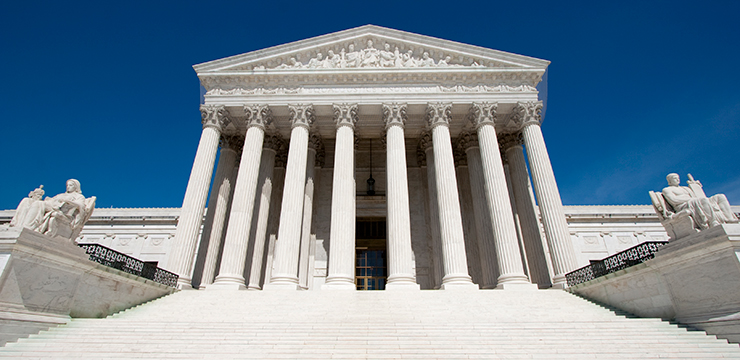Lauren Drake
Partner
Los Angeles
Lauren Drake focuses on complex patent litigation, patent post-grant proceedings, and licensing disputes in the life sciences sector, drawing on her background in biochemistry and molecular biology. She has defended clients and their innovations before U.S. District Courts, the Federal Circuit, the International Trade Commission, and the Patent Trial and Appeal Board.
Lauren has represented clients in connection with a broad spectrum of technologies, including small molecules, biologics, DNA sequencing, gene editing, recombinant DNA technology, and medical devices. She brings experience in litigation under the Hatch-Waxman Act and the Biologics Price Competition Innovation Act (BPCIA).
Lauren was recognized by Law360’s Rising Stars as “one of the top intellectual property attorneys under the age of 40” in 2019. She was also named to Benchmark Litigation’s “40 and Under Hot List,” which honors the achievements of the nation’s most accomplished litigators under 40.
-
- Genentech and Hoffmann-La Roche Inc. v. Sandoz and Lek. Currently representing Genentech and Hoffmann-La Roche in a non-ANDA patent infringement lawsuit filed in the US District Court for the District of New Jersey against Sandoz and Lek relating to defendants' generic version of Genentech's product Esbriet, a blockbuster treatment for idiopathic pulmonary fibrosis. Defeated Sandoz's motion to transfer the case to Delaware, where prior ANDA litigation took place. The case is now proceeding to discovery.
- Confidential International Arbitration. Currently representing a leading biotechnology company in an arbitration pending in the International Court of Arbitration of the International Chamber of Commerce filed by a large multinational pharmaceutical company. The case involves claims for breach of a license and collaboration agreement between the parties. The claimant has valued the case at more than $500 million.
- Novartis v. Genentech. Currently representing Genentech in a dispute with Novartis in which Novartis seeks to avoid paying royalties owed on its drugs Cosentyx and Ilaris under a patent license agreement based on product manufactured and imported into the United States before, but sold after, expiry of the licensed patents. Novartis also sought to recoup more than $200 million in royalty payments it made under the licensed patents for the drug Cosentyx, claiming it did not need the license because its product did not practice the licensed patents. On May 2, 2023, the US District Court for the Northern District of California granted Genentech’s motion to dismiss all of Novartis’ claims seeking a refund of the $200 million in royalties paid on Cosentyx. The Court also refused Novartis’ request for leave to amend its complaint, finding that any amendment would be futile. The case has now been remanded to California Superior Court, where the only remaining dispute is whether Novartis is obligated to pay royalties to Genentech for product made and imported into the United States before, but sold after, expiry of the licensed patents.
- Corteva v. Inari. Currently representing Corteva in a lawsuit against Inari. Inari wrongfully obtained Corteva’s seeds from an international depository and then illegally exported them from the United States to Belgium. Inari apparently plans to genetically engineer the seeds, including by employing AI-powered CRISPR gene editing, and then commercialize them in violation of Corteva’s patents, Corteva’s plant variety protection certificates and various state laws. This lawsuit addresses novel legal issues to protect Corteva’s proprietary gene editing technology and decades of investment in seed development. Corteva is seeking damages and a permanent injunction against Inari.
- Tris Pharma v. Actavis and Teva – Maintained exclusivity until patent expiration for Tris Pharma’s two highest grossing drugs. Secured an important victory on behalf of Tris Pharma, Inc. in the District of Delaware in an ANDA litigation lawsuit against Actavis on patents that cover Tris's Quillivant XR® product. The district court found Actavis directly and indirectly infringed all asserted claims and that all asserted claims are not invalid. This ruling will prevent Actavis from commercializing its generic version of Quillivant XR® at least until 2031, when the infringed patents expire. In the District of New Jersey, secured an important victory following a bench trial against Teva on patents that protect Tris’s QuilliChew ER® product. This victory will prevent Teva from commercializing its generic version of QuilliChew ER® until at least 2033, when the infringed patents expire.
- Peter v. NantKwest/NantKwest v. Lee. Represented NantKwest before the district court, Federal Circuit, and Supreme Court in a 35 U.S.C. § 145 action relating to natural killer cell based therapies for cancer and the Patent and Trademark Office's ability to recover attorneys' fees under § 145. Ultimately, the Supreme Court unanimously sided with NantKwest, and struck down the U.S. Patent and Trademark Office's policy that applicants who appeal to a district court must foot the agency's attorneys' fees.
- Genentech and Biogen v. Celltrion and Teva; Genentech and Biogen v. Sandoz. Represented Genentech and Biogen in biosimilar litigation under the BPCIA relating to their blockbuster drug, Rituxan. One lawsuit settled on favorable terms shortly before the court was scheduled to begin a four-day trial on Genentech and Biogen's motion for a preliminary injunction against Celltrion and Teva. In addition to multiple district court litigations, we defended Genentech and Biogen against 25 IPR petitions at the PTAB and secured 16 non-institution decisions, four adverse judgments against petitioners (who abandoned the proceeding), and three final written decisions rejecting the attack on all claims.
- Regeneron Pharmaceuticals v. Genentech. Represented Regeneron Pharmaceuticals in connection with a patent case in the US District Court for the Southern District of New York relating to Regeneron's Eylea and Zaltrap anti-angiogenesis drugs.

